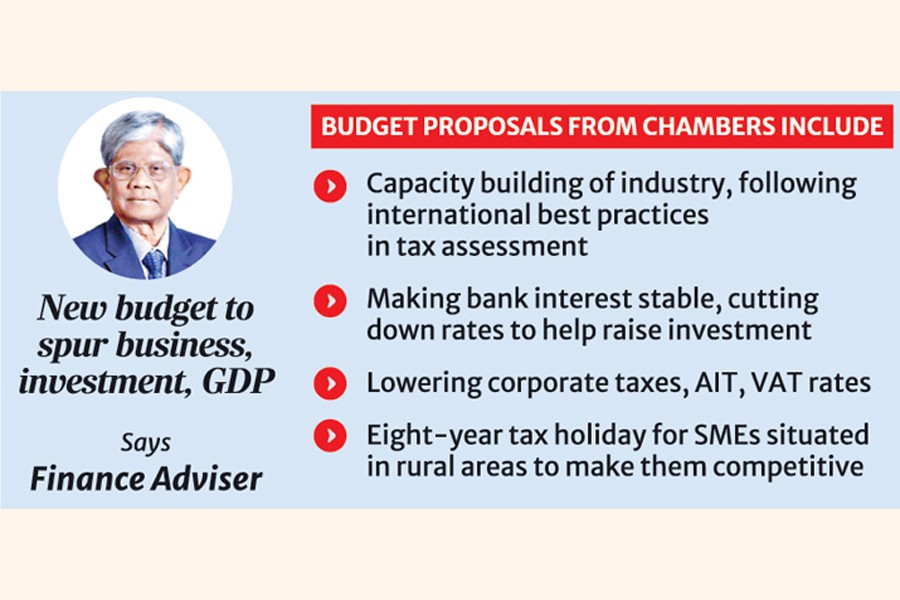
Published :
Updated :

Top trade bodies of Bangladesh have urged the government to make the next national budget business-friendly by slashing taxes, digitising tax system and removing various complications that undermine the ease of doing business.
Finance Adviser of the interim government Dr Salehuddin Ahmed told leaders of the chambers at a pre-budget meeting at his secretariat office on Thursday that the government wants to make the budget business-friendly so that investment and gross domestic product (GDP) increase.
"There are some shortcomings in case of digitisation of tax payments which we are trying to address," he apprised reporters after the meeting about his assurances given to the business leaders.
He said measures will be taken to resolve HS code-related complications to facilitate trade and business.
The business bodies also urged the adviser to take measures for capacity building of industry and to follow international best practices in the case of tax assessment.
They also requested making interest on bank loans stable and cutting down the rates to help raise investment.
Business leaders and administrators from the Federation of Bangladesh Chambers of Commerce and Industry (FBCCI), Bangladesh Garment Manufacturers and Exporters Association (BGMEA), Bangladesh Knitwear Manufacturers and Exporters Association (BKMEA), Dhaka Chamber of Commerce and Industry (DCCI), and Bangladesh Chamber of Industries (BCI) attended the meeting, among others.
The FBCCI proposed that the adviser take effective measures for stopping money laundering, raising remittance inflow and foreign-exchange reserves, rationalising duties and taxes for CMSME sector, helping export diversification through providing bond facility, and expansion of tax net.
Also, the apex trade body urged bringing order and good governance in banking sector, withdrawal of AIT on all the industrial raw materials, setting up another large taxpayers' unit in Dhaka and one in Chattogram, and entrusting the responsibility of implementation of national tariff policy to the National Board of Revenue and Bangladesh Trade and Tariff Commission.
In its budget proposal the BGMEA asked for not realising company tax at the rate of 30 per cent rather realising 12-per cent corporate tax in apparel sector, realising AIT for sub-contractors at 1.0 per cent instead of 5.0 per cent, and waiving the 15-per cent value-added tax (VAT) on recycle-fibre producers while selling their goods to local spinning mills.
Also, the apex apparel body submitted various proposals relating to HS Code-related complications, problems related to import general manifest, providing duty-free or low- duty import facilities for some more equipment and materials that will be used for modernisation and making factories safer.
In its proposal DCCI demanded of the government not to enhance tax burden rather to expand tax net, digitise tax system, take steps for submission of corporate tax online, introduce unified single-digit VAT system, six-month moratorium system to avert businesses becoming defaulter, and loan restructuring on easy conditions.
President of BKMEA Mohammad Hatem said at the meeting the chairman of the National Board of Revenue had assured them of bringing changes in taxation system.
He said presently the NBR collects advance income tax (AIT) at the rate of 1.0 per cent from businessmen, which is not a final settlement. And at the same time, the tax authority does not give back the money, nor adjusts with the actual amount of AIT to be charged.
"This practice raises the rate of tax for businessmen," he said, citing one example of complexities the businesses have been facing.
"We have requested the finance adviser to lessen value-added tax in some areas. We have requested resolving the complications relating to HS codes over six digits at Chattogram Customs House," he added.
He also said the businesses requested resolving the cash invectives-related complexities.
President of BCI Anwar-Ul-Alam Chowdhury (Parvez) said the businesses requested the government to follow the international best practice in the case of tax assessment.
He said the VAT on SME sector needs to be lowered to help them become competitive. Moreover, a tax holiday for eight years can be granted for the SMEs situated in the rural areas.
syful-islam@outlook.com


 For all latest news, follow The Financial Express Google News channel.
For all latest news, follow The Financial Express Google News channel.